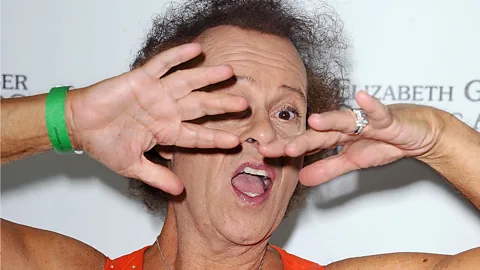The new Richard Simmons biopic starring Pauly Shore chronicles the life of the icon who disappeared from public life a decade ago. But should it?
Richard Simmons, one of the best-known faces in the fitness industry, is getting a biopic. While some might consider it an honour to be immortalised in a film that details their life's work, this 75-year-old isn't pleased. In fact, he says he has "never given permission" for the film's production, in which he will be portrayed by actor Pauly Shore. (There is already an unrelated short film called the Court Jester, also starring Shore as Simmons, premiering today at Sundance and then on YouTube). In a message to his Facebook followers on Wednesday, Simmons expressed his lack of support for the film. "So don't believe everything you read," he wrote. "I no longer have a manager, and I no longer have a publicist. I just try to live a quiet life and be peaceful."
Simmons iconic Sweatin' to the Oldies workout videos garnered him widespread fame throughout the 1980s, 1990s and early 21st century. However, in 2014 he stopped making public appearances. A podcast called Missing Richard Simmons, created by Dan Taberski, launched that year and continued to gain in popularity – it was number one on iTunes in February 2017. The popularity of the podcast showed that the public was genuinely fascinated with the fitness star's life, and with why he decided to essentially go into hiding. But one thing was clear: Richard Simmons didn't want to be the subject of a podcast that spun different theories about what had happened to him – and was criticised as being potentially invasive. He declined to take part in its production, but the host said, in an interview with The New York Times, that it was being made out of "concern" for Simmons.
Now that there is a biopic on the horizon – one that Simmons has fully disavowed – questions about ethics are hard to ignore. But it's not illegal to make a film about someone without their consent. According to US copyright laws, as long as the information is obtained legally, creators are free to create. As more films about intriguing celebrities and cultural figures are made, the issue is surfacing more often. Pamela Anderson reportedly said she would "never watch" the Hulu series Pam Tommy, which claimed to be a "true story", but was made without her consent.
Likewise, the production company making the Richard Simmons biopic says they will move ahead without the star's approval. "While we would love to have him involved, we respect his desire [for] privacy and plan to produce a movie that honors him, celebrates him and tells a dramatic story," the Wolper Organisation, a subsidiary of Warner Bros, said in a statement to The Daily Beast on Wednesday.

There may not be much that Simmons, or anyone, can do about being the subject of a biopic, at least until after the film is made. Mark Litwak, a Los Angeles-based entertainment attorney who represents celebrities, says that in the US, the First Amendment protects a filmmaker's right to share stories, and if they want more protection, they can obtain a release for the rights.
The real issue for filmmakers, he says, is involving accuracy. "The problem is that even if you want to tell the story as accurately as possible, sometimes you want to make changes," he tells BBC Culture. Those edits or condensations can be for various reasons, such as screen time and not confusing the audience. However, taking those creative liberties can lead to lawsuits over defamation, Litwak adds. While lawsuits against productions don't necessarily mean the case will be won, Litwak says there's a reason that biopics are often released right after someone dies. It's because "there's much less legal exposure" that way.
But filmmakers are going to make films – and biopics are no exception. As Linda DeLibero, a senior lecturer in film and media studies at Johns Hopkins University, tells BBC Culture: "despite the innumerable examples of subpar biopics, I have to agree that it is justifiable. Would I want to live without The Social Network just because Mark Zuckerberg might be upset with his portrayal? I don't think so."
She continues: "The best of these films usually end up humanising their subjects to the point where they garner audience sympathy (deserved or not)." She imagines that may be true in the case of the Simmons biopic. "And if the film turns out to be a masterpiece, that's the price of art," she says. "Celebrities make a bargain with their fans [regarding] their privacy the minute they step into the limelight. Ordinary people – unless they're influencers or social media stars – have entered into no such contract."
As for the as-yet-unnamed biopic, it doesn't have a release date at this time; Wolper told Variety the studio was in discussions with a writer who'd handle the project with care.



